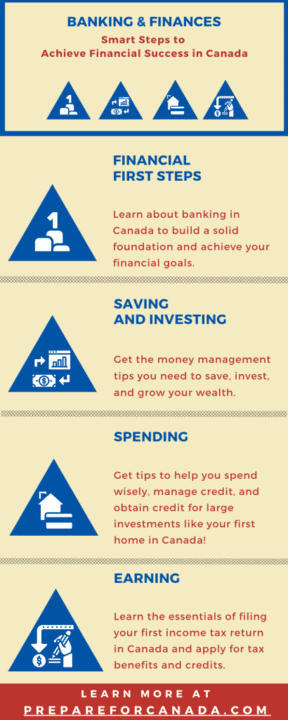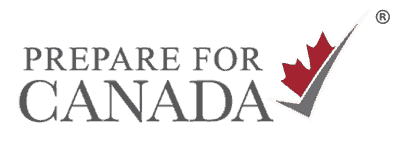Banking & Financial First Steps in Canada

Knowing about banking in Canada can help you to achieve financial success in Canada! Each year Canada welcomes many immigrants eager to build a new life in Canada. And achieving greater financial security is a significant dream and goal for newcomers. Your financial goals for yourself and your family are important.
However, to take advantage of financial opportunities you need to understand the basics of banking in Canada. This is important because you may have arrived from a country that has a different system from Canada’s banking system. So, it’s important to build your knowledge to take advantage of banking offers and make wise money decisions.
From getting credit to buying your first home in Canada, it’s important to build a solid financial foundation. Because when you understand the rules, benefits, and fees that come with financial products or services, you’ll be off to a great start.

There are important steps that you can take before you arrive in Canada. Equally important, there are things that you can do after you arrive in Canada.
Banking in Canada: Financial First Steps
Learn about banking in Canada to build a solid foundation to achieve your financial goals.
Achieving your financial dreams will be easier when you understand the basics of banking in Canada. Things like understanding transferring finances and the:
– Different savings, chequing, or combination bank account options
– Monthly banking fees
– Credit card choices
– Bank products to help you save for your child’s education, or
– Mortgage options to help you buy your first home in Canada.
Canadians rely on their bank to receive their paycheques, pay bills, and protect their money. With the right bank and accounts, you can manage your money wisely, save money, and earn interest.
There are two types of accounts in Canada:
1. Chequing Accounts
2. Savings Accounts
Within each account, you will have different options to choose from. And the different options offer benefits and fees. So it’s helpful when you open your account to speak to a bank advisor. They can help you to decide which accounts would be best for you based on your unique banking needs. This is important because different accounts have fees that may include:
– Monthly chequing account feeds
– Foreign transaction fees
– Automatic bank machine (ABM) fees.
A bank advisor can help you to select the right account to reduce those fees to save you money.
Some people like to open accounts at more than one bank because of different bank offers. While you can open bank accounts at more than one bank, you’ll find that the monthly bank fees can quickly add up. So keep this in mind when deciding if you want to open a bank account at more than one bank in Canada.
Did you know that you can open a bank account in Canada before you arrive? Scotiabank is one of the few banks that allow you to open a bank account online while still in your home country.
In addition to convenience, opening a bank account allows you to show proof of settlement funds when you arrive in Canada. You can read more about proof of funds here: How Much Money Will I Need to Move to Canada?

Saving and Investing
Get money management tips you need to save, invest, and grow your wealth.
Financial experts agree that it’s best to start saving for your retirement in your 20s or at least early 30s. The sooner you start, the less financial pressure you’ll feel. But even if you start saving later, the point is to start saving as soon as you arrive in Canada.
Saving for your future in Canada is important. Putting money aside for yourself and your family’s future is easy when you use a savings account or other forms of investment such as a:
– Registered Retirement Savings Plan (RRSP)
– Registered Education Savings Plan (RESP)
– Tax-Free Savings Account (TFSA).
Registered accounts such as RRSPs and RESPs allow you to save for the future through tax-sheltered savings programs. And a TFSA helps you to grow your money tax-free. A benefit of the TFSA is that you won’t pay tax on money in the account, not even when you withdraw it.
Most people in Canada build their retirement savings through RRSPs. You can read more about savings options in Canada here, Savings in Canada: Helping Newcomers Invest.
If you’re coming to Canada with young children, you can start saving early for their college or university education. Post-secondary education is expensive in Canada, and most families save for years to cover education costs. When you make it a habit to save even a small amount of money each month, it can make a big difference. And over time, the interest compounds and you build a healthy fund to pay for your child’s post-secondary education.
Saving and investing in Canada will allow you to:
– Build an emergency fund (savings to cover three to six months of expenses)
– Save for your retirement
– Save for your child’s education
– Take advantage of tax shelters to save money for your future, and
Many of these products can be confusing to newcomers, so it’s helpful to understand their benefits so you can start saving as soon as you arrive. You can read more about the basics of RRSPs in Retirement Savings: Demystifying RRSPs.
The choices you make depend on your knowledge, so it’s important to learn about various forms of investment. For more tools and resources to help you learn about banking in Canada, you may be interested in reading financial literacy is important for newcomers.
Spending
Get tips to help you spend wisely, manage credit, and get credit for large investments like your first home in Canada.
When you arrive in Canada, it may take some time before you find your first job and start earning a steady income. So how you manage your money will be critical during your first few months in Canada.
You may have to rely on the money you saved to immigrate to Canada initially. So it will be essential to spend wisely and minimize your expenses. Creating and sticking to a budget can help to reduce financial pressure. You can easily plan and manage your finances with this helpful budget planner.
At the same time, you have to build your credit history in Canada. So it’s important to know how to use credit wisely.
Earning
Learn the essentials of filing your first income tax return in Canada and apply for tax benefits and credits.
Getting your first job and paycheque in Canada is exciting! But, you’ll also quickly realize how much you have to pay for taxes such as:
– Federal and provincial taxes
– Canada Pension Plan, and
– Employment Insurance.
Filing your income taxes for the first time in Canada may seem overwhelming. But there are resources available to help you:
– Understand the Canadian tax system
– Learn how to file a tax return
– Find out about tax deductions
– Claim tax credits such as the GST/HST credit, Canada child tax benefit, and child care benefit.
So when you file your income tax return, you’ll learn how to get tax benefits and credits that will put money back in your pocket.
When you know the basics of banking in Canada, you’ll be on your way to financial security and success!
RECENT POSTS
SEARCH ARTICLES
SIGN UP FOR EMAIL UPDATES
Unsubscribe anytime

